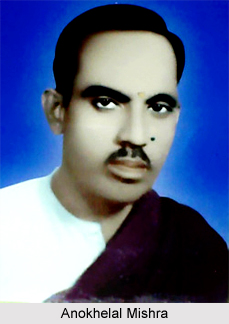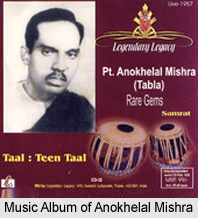 Anokhelal Mishra, also known as Pandit Anokhelalji, was an esteemed Tabla player belonging to the Banaras Gharana of Hindustani classical music. He was recognized as the Samrat (king) of Tabla playing and was often addressed as Tabla Samrat Pandit Anokhelal Mishra. He was known for his sombre nature and simple lifestyle who restrained publicizing himself as a celebrity. He was called as the wizard of specific Tabla syllables like `Dhere Dhere Kite Taka` and `Na Dhin Dhin Na` (theka of Teen Taal- 16 beats). He was also accredited for popularizing the Banaras style of Tabla.
Anokhelal Mishra, also known as Pandit Anokhelalji, was an esteemed Tabla player belonging to the Banaras Gharana of Hindustani classical music. He was recognized as the Samrat (king) of Tabla playing and was often addressed as Tabla Samrat Pandit Anokhelal Mishra. He was known for his sombre nature and simple lifestyle who restrained publicizing himself as a celebrity. He was called as the wizard of specific Tabla syllables like `Dhere Dhere Kite Taka` and `Na Dhin Dhin Na` (theka of Teen Taal- 16 beats). He was also accredited for popularizing the Banaras style of Tabla.
Early Life of Anokhelal Mishra
Anokhelal Mishra was born in the year 1914 in Varanasi of the Indian state Uttar Pradesh to a very poor family. He had learnt Tabla under the tutelage of Bhairow Prasad Mishra. The latter after discovering his talent enrolled him in the Banaras Gharana of Ram Sahaiji as a student of Tabla at the age of 5 or 6 years. For about 15 years, Anokhelal Mishra learnt the skills of playing Tabla under Bhairow Prasad Mishra, who himself was the disciple of Bhagat-ji. The latter was in turn the disciple of the founder of Banaras Gharana, Ram Sahai. Among the noted disciples of Bhairav Prasad Mishra like Nageshvar Prasad, Mahadev Prasad Mishra, Mahavir Bhatt and Maulvi Ram Mishra, the most renowned was Anokhelal Mishra. As a teenager Anokhelal Mishra had lost his parents after which his grand mother brought him up. During his childhood, he had a close encounter with deprivation and poverty.
 Career of Anokhelal Mishra
Career of Anokhelal Mishra
Throughout his musical life Anokhelal Mishra used to have extensive practice sessions daily for long hours under the guidance of his Guruji. His expertise in playing the syllables of Tabla with considerable clarity was greatly admired. He was skilled in playing the syllable `Na Dhin Dhin Na` very fast with his first finger. He was known to be a great accompanist as well as soloist. During his career he had rendered a number of solo concerts. He had also accompanied several renowned classical dancers and musicians including Ustad Ali Akbar Khan, Ustad Vilayat Khan, Ustad Allauddin Khan and many more. In his short life span he managed to perform throughout the country at a regular basis. For many a time he performed in the National Programme of Music on All India Radio, which during that period was considered to be a prestigious matter. In late 1950s the Voice of America also broadcasted his programs. Many disciples of Anokhelal Mishra such as Chakkan Lal Mishra, Partha Nath Shastry, Bityut Banerjee, Chandra Nath Shastri etc have established themselves as prominent entity in the world of Indian classical music. The album `Samrat Rare Gems, Tal: Teental`, (Duration: 45.27mins) accompanied in Harmonium by Gyanprakash Ghosh contains his recordings dating back to 26th of December 1957 in a music concert.
Death of Anokhelal Mishra
Anokhelal Mishra died on 10th March 1958 at the age of 44 after being afflicted by Gangrene of his left foot in the year 1956.




















